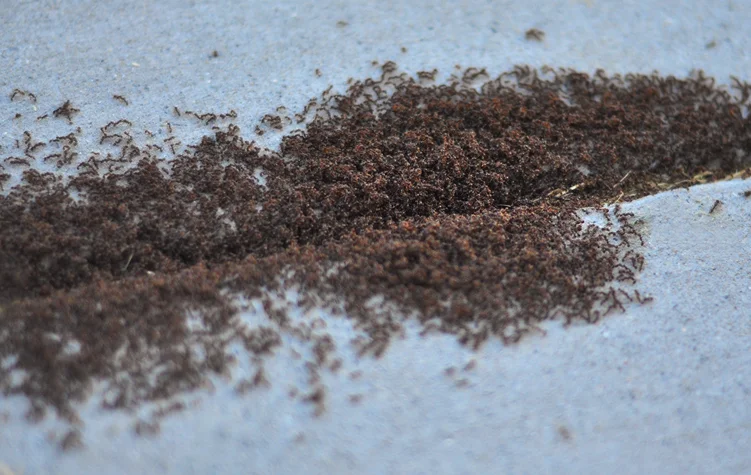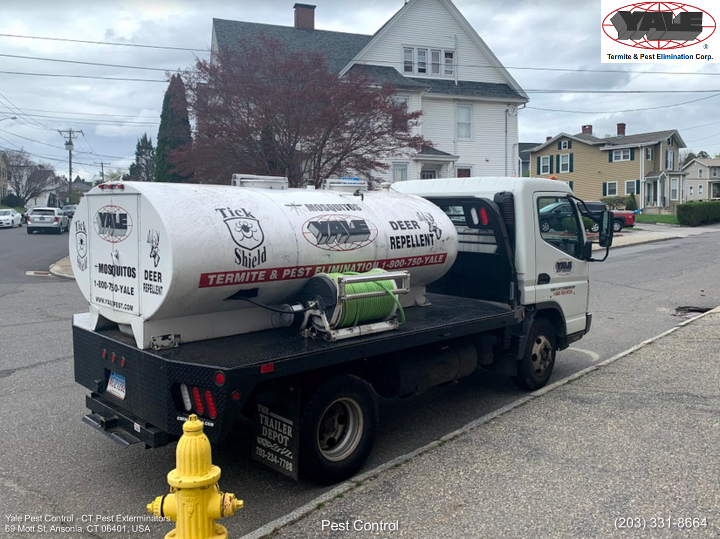
Once a pavement ant colony has chosen your home as a food source, dealing with this pesky insect can be tricky. There are a lot of different ways to clear your house of pavement ant infestations, and deciding can be difficult. Thankfully, there are a number of highly effective natural methods to get rid of these pests.
So how do you get rid of pavement ants naturally? Some inexpensive and natural solutions include using vinegar, chalk or baby powder, Borax, essential oils, herbs and spices, and ground coffee, among many other options. For best results, consult with a pest control company, especially if the insect infestation gets out of hand.
Wipe your worktops, cupboards, and any other areas where ants have been discovered with a 50-50 solution of white vinegar and water. To maintain efficacy, repeat the procedure throughout the day. Aside from repelling ants, vinegar has a variety of other purposes, including sanitation of the application area.
Ants despise the smell of vinegar, and it can eliminate the scent trails that ants use to navigate. If you watch the activity of pavement ants, you'll notice that they all take the same route into and out of your home. By eradicating the ant scent trails, these ants will become disoriented and lost and will want to avoid the location.
Meanwhile, vinegar might be too harsh on natural stone surfaces because of its acidity. If your counters are made of granite, marble, quartz, or another type of stone, wipe them off with your usual spray cleaner instead – they’re just as potent in rubbing scent trails.
Here's another simple solution. Just draw a chalk line in front of the location where the ants are entering your home, and it will function as a deterrent for crossing it. To keep your chalk line deterrent effective, reapply and draw a line every now and again.
The calcium carbonate in the chalk is toxic to ants. Others believe the chalk line interferes with their scent trails. Whatever the case may be, it appears to work, so try it for yourself and see what you think. You may even put your children in charge of pest control for this handy method.
Combine a teaspoon of borax with 5 ounces of syrup, jelly, or sugar. After that, put the mixture somewhere where the ants will be able to find it, preferably near the entrance of their colony or the entrance of your home. If you have small children or dogs, make sure it is out of reach, although it's completely natural, it can pose a danger for smaller beings.
Borax is a slow-acting toxin that destroys the digestive tracts of ants and is passed on to the rest of the ant colony, working as a slow-acting bait that's completely chemical-free. You can even place this mix in bait stations so that they are protected from the natural elements.
In the area where you've spotted the ants, scatter cinnamon, mint, chili pepper, black pepper, cayenne pepper, cloves, or garlic. Then apply the same spices to your home's foundation, specifically entrance points. Bay leaves can also assist to keep ants away by being placed in cupboards, drawers, and containers.
Certain essential oils have also been shown to have anti-ant properties. Sprinkle a few drops of peppermint, citrus, eucalyptus, or cinnamon oil on some cotton balls and place them in the ant hotspot. As the aroma of the bay leaves fades away, switch them out for new ones for consistent ant repelling.
In the wild, many plants, including those listed, emit a powerful aroma that repels ants and other insects, and they work just as well in your house. Peppers should not be used if you have pets or little children as peppers contain capsaicin, which can cause irritation to mucosal membranes, and children and dogs should not have access to essential oils either.
Scattering old coffee grounds in your garden and around your home can repel ants. The grounds are an excellent method of pest management for pets. Coffee grounds, which are high in minerals such as potassium, phosphorus, and magnesium, are also beneficial for your soil.
Place cucumber or citrus peels in recognized ant hotspots and entrance points. Citrus peels have been demonstrated to have antifungal properties, preventing the development of ants. Use lemon-lime-scented cleansers if you're fighting ants in your kitchen or bathroom. Look for products perfumed with real citrus oils for the best effects as synthetic scents won’t produce the desired solution.
Surfactants are used in dish soap which will dissolve the waxy covering on the outer shell of ants as soon as they come into contact with it. It also enters the insect's breathing passages, preventing it from breathing.
Soap suffocates pavement ants, killing them without the harsh chemicals' adverse effects. Simply combine half a cup of dish soap with one cup of water to make your own DIY ant spray. Combine all of the ingredients until the soap is completely dissolved, then transfer to a spray bottle. Spray them directly onto the ants when they’re foraging or on the entrances of their colonies if you can find them.
Pavement ants are also controlled with diatomaceous earth, an all-natural substance. It's a powdered organic product available at garden centers and big-box supermarkets. The fossilized remains of diatoms are used to create the powder. The leftovers are crushed into a thin powder that is easier to disperse for pest control.
The powder is fairly harmless to people and though inhalation has some dangers, it is still generally regarded as a safe substance. Pavement ants and other hard-bodied insects, however, are killed by it from mere contact.
When powder falls upon an ant's body, it scratches their bodies at a minuscule level. The ant eventually bleeds out and dies and also causes the pavement ants to get dehydrated as their shells can no longer retain moisture.
One of the simplest natural solutions is to pour a gallon of water on the colonies of pavement ants. This direct method has the potential to wipe out the entire colony if directly put into their colonies. The technique should be repeated once a day until all of them have been eliminated.
Window cleaners are another safe household cleaner that is efficient in killing ants and very hazardous for them. Spray liquid window cleaners like Windex straight on pavement ants to destroy them. To keep them away, clean their traces with window cleaners as well so that others cannot follow in their footsteps.
These food substances make for the perfect ant baits. Cornmeal and raw cream of wheat are both difficult for pavement ants to digest, ultimately resulting in their death. This is best mixed with something attractive to them, such as sugar.
When they ingest raw cream of wheat, the material tends to expand in their stomachs, eventually killing them. For an effective mix, combine 1 tablespoon honey with 3 tablespoons uncooked cream of wheat to attract and kill pavement ants. Place it in their colonies and wait as they eat it thinking that it's a viable food source.
Since pavement ants are so common, there's always the possibility of them returning. Don't take it for granted that you've entirely eliminated them, it's best that you stay proactive to avoid further intrusions. Seal all entrance points first and fill gaps and fissures in your home's foundation and external walls using concrete filler. Also, consider using color-matched caulk to fill any gaps around windows and doors.
Be sure to remove any potential attractants from your surroundings. This is especially true for things like greasy foods, sweet foods, dead insects, dirty dishes, pet food, and food particles on your kitchen floor that can lead to the infestation of pavement ants. This entails relocating brick piles or concrete slabs that have been shattered. Keep pruned and well-maintained plants along the perimeter of your property.
Ensure that no brush or mulch can create a hospitable environment for these ants by cleaning it up. Finally, you can take advantage of various home defense solutions mentioned above to keep pavement ants at bay. These solutions must be used on a daily basis depending on their efficacy rate to keep ants and other pests at bay.
It's crucial to clean periodically even after you've done certain preventative measures. Vacuum your floors on a regular basis and clean up spills. Food crumbs and other possible attractants should be cleared by regular sanitation checks.
If you believe you want more assistance, you should have your property evaluated by a pest control specialist. They will not only be able to spot indicators of an infestation, but they will also be able to diagnose issues before additional pavement ants arrive.

As a family-owned group of pest control professionals, we completely understand the need to keep your family safe from harmful chemicals. Should you feel that natural methods aren't enough to keep these dark brown pests out of your home, we employ 100% safe pest control methods that can keep any type of ants away from your home.
We know all the effective methods to deal with infestations of any pest or insect that might be plaguing your home, as well as preventive methods to keep infestations at bay for a long time. Get back your peace of mind and call us now at 800-750-9253.